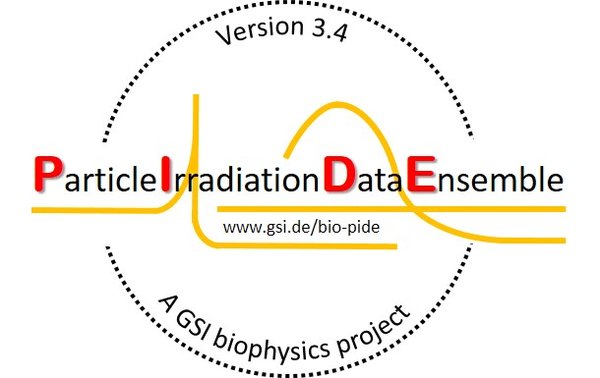PIDE Project
Access to the Particle Irradiation Data Ensemble
PIDE in a Nutshell
PIDE is a radiobiological database compiling more than 1200 pairs of in-vitro cell survival experiments after photon and ion irradiation.
It is a compilation of results drawn from 131 publications.
It is convenient to study the relative biological effectiveness (RBE) for clonogenic cell survival as endpoint, or to benchmark RBE predicting models against experimental data.
The most recent version PIDE 3.2 also provides the raw data (dose and surviving fraction) for most of the experiments.
PIDE contains experiment specifications, i.e. the investigated cell lines, radiation qualities used and delivery techniques; all of these are relevant for RBE.
This allows to investigate generic trends and impacting factors of the measured radiation effects.
PIDE uses the linear quadratic model to parameterize the dose response.
Data are presented as tables stored in easily accessible file formats: an Excel file (experiment description and linear-quadratic parameters) and ASC-II tables (raw data).
PIDE is freely available to the research community after registration on this home page. Important: An institutional E-mail address is requested for registration.
It will be updated from time to time.
The developers work on PIDE continuously by gathering new publications, so hints from the community about publications missing so far in PIDE are most welcome.
Reference Publication
Detailed information on the update of the PIDE to version 3.2 with general results can be found here [1]. Information on the development of the PIDE 2.0 as well as first results were published in [2], which is the current reference publication for PIDE.
News
Sept 2023 | Release of PIDE Version 3.4 |
2023 | V. Pruy works in his Bachelor project on increasing PIDE with new data |
2022 | Bugfixing led to (internal) PIDE version 3.3 |
Jan 2022 | A publication on testing the GSI biophysical model for high LET response (Local Effect Model, LEM) against PIDE was published, see [3]. |
Nov 2019 | Release of PIDE Version 3.2 |
Nov 2019 | Bug fixing: For a few experiments the complete set of certain LQ parameters was added, which was missing before. |
Aug 2019 | Release of new update: PIDE 3.1 (containing raw survival data) |
Jan 2019 | T. Pfuhl joins the PIDE developer team, cross-checking all data for consistency within the database |
2018-2019 | Bugfixing and preparation of new release |
2015-2016 | A. Bothe works on the update to PIDE 3.0 (internal version) as part of his master thesis, including raw data of experiments |
May 2013 | A paper on the set-up of PIDE2.0 and about first obtained scientific results is published in an open access Journal [2]. |
Mar 2013 | A contribution of the PIDE project was published on the NASA website The Health Risks of Extratesetrial Environments (THREE) |
Jan 2013 | Launch of PIDE Project site |
How to get PIDE?
- Please register here and you will be provided with the files of the newest PIDE version via e-mail as soon as
possible. Please note that we request an institutional e-mail address to process your inquiry.
- The current release version is PIDE 3.2.
- If you are interested in a prior release version of the PIDE or additional developing material, please contact us.
If you receive the PIDE, you will find the following files:
- Information_sheet.pdf: In this file some remarks on the usage of PIDE data are given. PLEASE READ CAREFULLY to
avoid inconvenience! - Overview_table.pdf: A table giving an overview of all publications included in PIDE, comprising experimental conditions.
- References.pdf: List of references used in PIDE.
- Pide_x.x.xls: Database including experimental details and linear quadratic parameters.
- PIDEx.x_PhotonRawData.dat: A table containing the raw data of the photon survival curves.
- PIDEx.x_IonRawData.dat: A table containing the raw data of the ion survival curves.
All registered PIDE users will be informed via e-mail if updates are available or errors in the database have been revealed. For this reason, we kindly ask all users not to distribute the files among colleagues but rather ask them to register on this web site.
Contact
For questions, criticism, new contributions to PIDE or other inquiries, please contact us by mail:
References
[1] Friedrich T, Pfuhl T, Scholz M. Update of the particle irradiation data ensemble (PIDE) for cell survival J Radiat Res, 62 (4), pp. 645-655 (2021) doi: 10.1093/jrr/rrab03 |
[2] Friedrich T, Scholz U, Elsässer T, Durante M, Scholz M. J Radiat Res, 54 (3), pp. 494-514 (2013) doi:10.1093/jrr/rrs114 |
[3] Pfuhl T, Friedrich T, Scholz M. Med Phys, 49 (1), pp. 714–726 (2022) doi:10.1002/mp.15343 |




